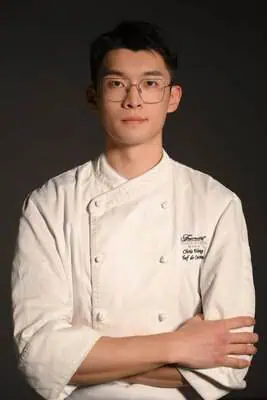
Interview Chef de Cuisine
Chris Wang is the Chef de Cuisine at the Cathay Room, Fairmont Peace Hotel Shanghai.
The Cathay Room and its namesake Terrace (Ninth-Floor Terrace) are located on hotel’s ninth floor. The restaurant offers modern European, home-style cuisine and Sunday Brunch.
The private balcony will astound you with its panoramic views of the Bund and the world-famous Pudong skyline. If you want the evening to be even more memorable, the balcony can be decorated to suit the occasion and you can choose live musical accompaniment to suit your mood.
The other day, I visited Chris at his hotel and we had a long interview. I really thanked him for taking the time.

1. What do you do at the Fairmont Peace Hotel?
I am the Chef de Cuisine at the Cathay Room.
2. Tell us about your journey. How did it all start?
My career officially started with an internship at the Peace Hotel, followed by further studies at the Le Cordon Bleu Culinary Institute in France, and then working at Michelin-starred restaurants in New York and London, such as Café Boulud, Le Gavroche, and Per Se. I am now back at the Peace Hotel as the Chef de Cuisine of the Cathay Room.
3. What is your philosophy on food?
My philosophy on food is to blend tradition with modernity. Tradition is indispensable, it forms the foundation of everything I do. I don’t aim to innovate for the sake of it; instead, I focus on improving what already exists. By using local ingredients, I adapt traditional flavors to make them more appealing and accessible to the local palate.
4. How might you describe the role of an executive chef?
The Executive Chef in the kitchen is like a general who needs to clarify the team’s goals, teach subordinates how to do things well, and ensure a smooth kitchen operation.
5. Please walk us through a typical day at work. How do you prioritize your tasks?
Meetings; organizing daily reservation information; confirming menus and recipes; working with the team on mise en place (note by the editor: everything is its place); completing daily services; summarizing in meetings; and refining the menus.
6. What is the most important aspect of being a good chef?
Curiosity.
7. Describe something that has surprised you as a chef.
Nothing so far, because the kitchen can operate according to standard procedures, so there is any surprise.
8. When you hire new staff, what do you look for in them?
Attitude and basic skills.
9. How might you describe your management style?
Strict, but focused on the issue. I allow the team to make mistakes but they must learn from them.
10. What is your greatest strength?
My overseas experience has made me open to new things and styles, and has diversified my cooking.
11. How do you handle conflicts in the kitchen?
Intervene in conflicts, find the cause, communicate, and solve the problem.
12. What is your favorite part of being a chef?
Being able to convey my ideas through dishes and make guests happy.
13. What is the part you dislike the most?
Sometimes efforts are not recognized.
14. How do you keep the kitchen in order?
Regular cleaning and ensuring clear division of labor at each station.
15. How do you keep up with cooking trends?
I read more, travel more, and eat more.
Books teach me cooking techniques and show how the same dish evolves over time, from traditional versions to modern interpretations. Traveling expands my perspective and helps me understand diverse food cultures, which is invaluable in the kitchen. And eating more isn’t just indulgence—it’s about training my palate and experiencing the work of different chefs. To create great food, you first have to know what great food tastes like.
16. What is your favorite ingredient to work with?
Seafood and poultry.
17. What is your opinion on local ingredients versus imported ingredients?
Most local ingredients have better freshness and are more suitable for local tastes. Some imported ingredients have higher quality and can provide a more luxurious experience for guests.
18. What is your method for sourcing local ingredients?
Visit local markets and exchanging experiences with other chefs and local foodies.
19. What is the most unusual ingredient you have used in cooking?
Chicken and lobster, a classic traditional flavor that is not heavy but full of umami.
20. What is the difference between your winter and spring menus?
The vegetables and flavors change significantly with the seasons. Winter menus feature more root vegetables and deeper, richer flavors, while spring menus highlight a greater variety of green vegetables and fresher, brighter tastes.
21. How do you control the quality of food served to customers?
I personally oversee the process, make the recipes public, and ensure a standardized kitchen output.
22. How would you describe your cooking style?
Traditional + Modern.
23. How do you develop new recipes? Do you have a creative strategy?
I start with the foundations of traditional French cuisine, and then incorporate local flavors and seasonal vegetables. This approach allows me to stay rooted in classic techniques while keeping the dishes fresh, relevant, and reflective of the ingredients around me.
24. What do you think is the best way for customers to describe your food?
That they show a pleasant surprise.
25. Tell me about a successful dish or recipe you have created.
One of my signature dishes is the Beef Duo. In the 1930s, beef stewed in red wine was considered a fine-dining classic, but today it’s more commonly found in bistros. Meanwhile, modern fine dining guests often prefer a perfectly roasted, high-quality cut of beef. This dish brings both worlds together. I use the stewed beef as a filling for delicate cabbage rolls, layer it into a lasagna-style accompaniment, and serve it alongside a beautifully roasted wagyu fillet. It’s a nostalgic yet elevated take on beef, combining tradition with refinement.
26. What do you do when customers request a change in ingredients?
I will try my best to meet the customer’s request if it is reasonable.
27. How do you handle special diets (e.g., gluten-free)?
We have special gluten-free and vegan menus to meet all customers’ needs.
28. Can you recall a time when you dealt with a dissatisfied customer?
No. There was none.
29. Can you tell us about the people you’ve trained or mentored? What are they doing now?
Well, some are working in foreign restaurants aboard, while others have opened their own restaurants. It’s rewarding to see their growth and how they’ve carried forward what they learned in their own unique ways.
30. What have you done or learned recently to improve your skills?
Every day, I study the dishes from the world’s top restaurants. It helps me recognize my own shortcomings and gives me a clearer sense of where and how I can improve.
31. Do you have knowledge of wine? Can you recommend wine pairings for the menu?
Compared to cooking knowledge, my knowledge of wine is a bit lacking. I cooperate with the sommelier.
32. Have you or your hotel received any industry honors or awards?
The restaurant I previously worked at was awarded three Michelin stars, and the hotel where I currently work holds a Forbes four-star rating.
33. What are your interests outside of work?
Traveling, sports, and reading.
34. What advice do you have for young people entering the industry?
Stay hungry for success and never give up.

+86 21 6138 6888
4001 200 634 (Toll Free room reservations only)
The Cathay Room and Ninth-Floor Terrace
Reservation +8621 6138 6881
20 Nanjing Road East, Shanghai 200002, China
Also read Review Fairmont Peace Hotel, Shanghai